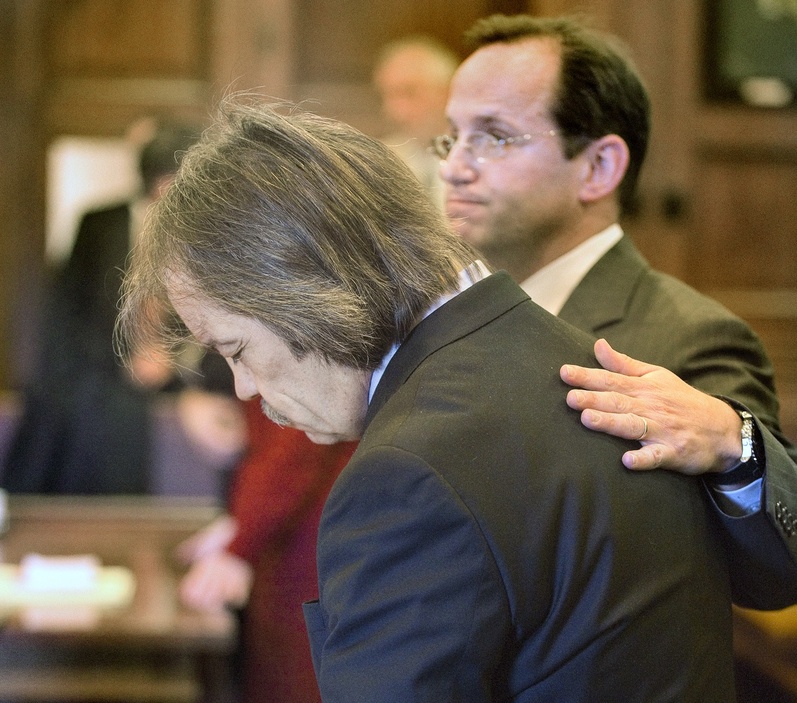PORTLAND – They remained silent, but the relief washing over the faces of Marion Shea’s relatives was obvious as the jury announced its verdict.
It had been more than a year since police found William Hanaman, barely breathing after a drug overdose, next to Shea’s body in his apartment on Ocean Avenue.
Since Monday, her family had waited as the jury decided whether Hanaman’s stabbing of Shea was murder, as the family believed, or an act of self-defense, as Hanaman claimed.
On Wednesday, Hanaman was convicted of murder in Cumberland County Superior Court. He will face 25 years to life in prison when he is sentenced.
Shea’s daughter, Stacy Vankeuren of Brunswick, said the verdict achieved justice and will help her family move forward.
“I can finally really say goodbye to my mother. These tears are happy tears,” she said.
The jury got the case Monday afternoon and deliberated for more than nine hours before reaching its decision. It also spent about two hours listening to a reading of Hanaman’s testimony and his cross-examination by the prosecutor.
Hanaman’s head hung down as jurors filed past him after delivering the verdict. He held his head in his left hand as Justice Thomas Warren discussed the sentencing hearing with the prosecution and defense. The sentencing will likely be held in several weeks.
The case began when Portland police, responding to a phone call from Hanaman’s sister, broke into his apartment on the morning of Nov. 11, 2009.
Shea was dead on the bedroom floor, stabbed eight times. Candles flickered around the apartment, a country music channel beamed from the television and a suicide note lay on the kitchen counter. Hanaman was taken to Maine Medical Center, where he recovered from an overdose of painkillers mixed with alcohol.
Hanaman, a 52-year-old handyman, took the stand for more than three hours last week. He testified that he blacked out and could not remember stabbing Shea, who was 47. But he recalled seeing a “shiny object” in her hand, and feeling that he was about to be killed.
“I seen flashes. I seen the anger in her face. I remember something shiny in her hand,” Hanaman testified.
Assistant Attorney General Leane Zainea said Hanaman’s story defied common sense. His actions after the stabbing — picking up the bloody items in the bedroom, driving to a grocery store to buy coffee brandy and writing a suicide note with no mention that he had been attacked — showed it was not a case of self-defense, she said.
“Even if she did have a knife in that room — which the defendant himself was not sure of, because he referred to it as a ‘shiny object’ — once he disarmed her of that knife, he did not have the right to use deadly force against her,” Zainea said after the verdict Wednesday.
Steve Shea of Portland, the victim’s brother, said, “The whole bit of self-defense — it was ludicrous to remember everything around an event and not be able to remember the event. Who could believe that?”
Shea and Hanaman dated for about a year. In October 2009, Hanaman was charged with domestic assault against Shea. A police officer saw her walking away from Hanaman’s apartment with a cut and blood above her left eye.
The conditions of Hanaman’s bail prohibited him from having contact with Shea, but they continued to see each other.
Hanaman testified that on Nov. 10, 2009, they fought over her abuse of prescription painkillers. He had a plastic bag filled with Shea’s empty pill bottles and straws, and planned to use them in court to defend himself against the domestic assault charge.
He said that as they fought over the bag, it ripped apart and the bottles fell to the bedroom floor. That’s when he says he saw Shea with a “shiny object” above her head, and he blacked out.
The next thing he remembered was being in his truck at a grocery store on Washington Avenue. He said he was shaking violently and his clothes were covered with blood. Hanaman said he returned home and found Shea’s body, then decided to kill himself.
Robert Levine, Hanaman’s lawyer, told the jury Monday that Hanaman reasonably feared for his own life, based on his previous altercations with Shea.
He said Hanaman’s system shut down after he realized he had killed the woman he loved.
Vankeuren said she doesn’t forgive Hanaman, but believes that he and her mother loved each other.
“It turned toxic. That’s what happened,” she said. “I do believe he is remorseful. I sense that from him up there on that stand.”
Staff Writer Trevor Maxwell can be contacted at 791-6451 or at:
tmaxwell@pressherald.com
Staff Writer Ann S. Kim can be contacted at 791-6383 or at:
akim@pressherald.com
Send questions/comments to the editors.




Success. Please wait for the page to reload. If the page does not reload within 5 seconds, please refresh the page.
Enter your email and password to access comments.
Hi, to comment on stories you must . This profile is in addition to your subscription and website login.
Already have a commenting profile? .
Invalid username/password.
Please check your email to confirm and complete your registration.
Only subscribers are eligible to post comments. Please subscribe or login first for digital access. Here’s why.
Use the form below to reset your password. When you've submitted your account email, we will send an email with a reset code.